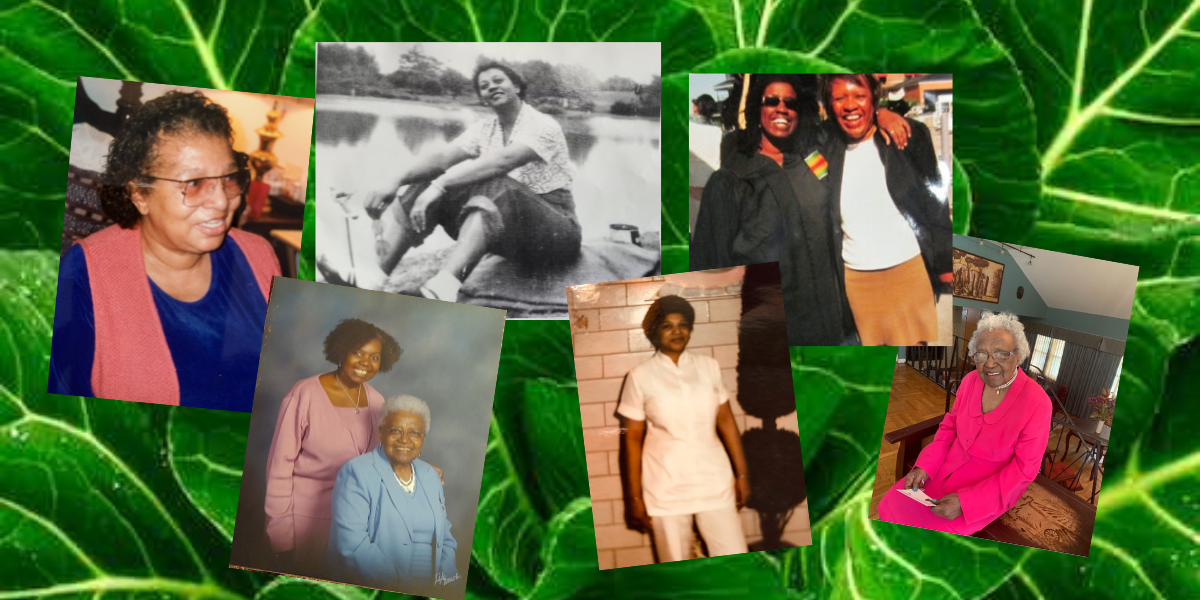The Language of Love–Listening and Learning Life Lessons Through Language

The second segment of Picking Greens and Being Green – Lessons from African American Mothers on Culture, Conservation and Community, entitled “The Language of Love–Listening and Learning Life Lessons Through Language”, focuses on Culture and Community and the knowledge our mama’s and mother figures imparted to us through sayings, quotes and language. My guests – Dr. Marva King, Ms. Vernice Miller-Travis and Ms. Leslie Fields shared part of their rich collection of memories and stories.
When I think of the title of this particular segment, a favorite song immediately comes to mind, as it epitomizes the concept behind the segment – Mother’s Song by Gregory Porter. The segment’s rich discussion, much like the song, talked about some of our favorite lessons (whether we knew at the time that they were lessons) and ensured that the lessons the panelists learned continue to be shared today.
As children, our kinfolks, particularly the women – mothers, grandmothers, aunts, cousins and others share their sage wisdom and customs with us, about safety, love, intelligence, money, and other survival skills. When the women in our families pass on that wisdom and knowledge and beliefs and customs from generation to generation, they become traditions. This is also known as memetics, a single word used to describe information, ideas, and culture passed or transferred from person-to-person and between generations.
The sharing of knowledge is an important part of our development. It not only keeps traditions alive, but the information imparted to us shapes us and informs our life choices. It helps us develop our morals, values and ethics and helps us develop our hopefully help us make good decisions throughout our lives.
This traditional knowledge is usually passed through ‘lessons or instructions’. For example, if a young girl is leaving home for any reason (for example, going out on a date or going to a dance or party), or if she is about to engage in some type of purchase or business opportunity, like buying a car), she was warned to be aware and be cautious with the admonition below.
This was a common phrase when I was growing up. I heard this many times from my grandmother and my Mama and her sisters heard it from their father.
In this segment, we heard instructions on how to show up in this world, how to be a good person and reminders that really shaped us – from Leslie’s example of walking into a room like you own the place, no hesitation – have pride and confidence, to Marva’s story about her mom’s lesson on the importance of acknowledging every you see (Black people), because “you do not know who knows your father”, or in my case (because I was told the same thing), my mother. By the time you arrived home, information about your behavior had already reached your parent, lol. Vernice’s memories of her mom’s lesson about never ‘looking down’ at anyone, because you never know who they were or who they might become.
These important messages are so very relevant today, as we contend with racial issues, social justice issues, and issues around attempts to take away our rights. These lessons are valuable still, not just for our youth, but for all of us.
Here are a few of the lessons these phenomenal women shared with the audience that resonated with me, and I hope resonate with you Dear Reader.
- Show up in the world in the best way possible (appearance and attitude!)
- Look out for each other as we walk through this life
- Carry your brother’s load when you can
- Every time you walk out the door, you represent [your family], ACT ACCORDINGLY and do not embarrass [them]
- Do not embarrass the [Black] race
- Respect everyone you see/meet
- Walk into a room like you own the place
- Walk into any space like you are supposed to be there, you are!
- Stand Tall – do not slouch (pride in yourself is important)
- No one is better than you. Also, you are not better than anyone else.
- You are just as good as everyone else
- Never look down on anyone else
- Never think you are better than anyone else
When we all think about the way we were raised, we did grow up in a village – whether it had village in the name, like Delano Village, the urban renewal project named after Franklin Delano Roosevelt, where Vernice lived and where her dad lived for 20 years, or it was just a street or neighborhood where the neighbors knew each other – I am sure we can all agree that there was safety in knowing as Marva stated, that people looked out for each other.
We invite you to watch this segment, (Passcode: p915vZ%0) and when you do so, whether you are reminded of the lessons you were taught through the language of love, or whether you learn something new, the one thing I know for sure is that each of us should always live these truths, follow these instructions and share them with others. We will be all the better for it.
And remember that at the end of the day, it does indeed take a village to raise a child, a community with shared responsibility for each other. We are all villagers in this World.
Also in this series...
Sorry, we couldn't find any posts. Please try a different search.
